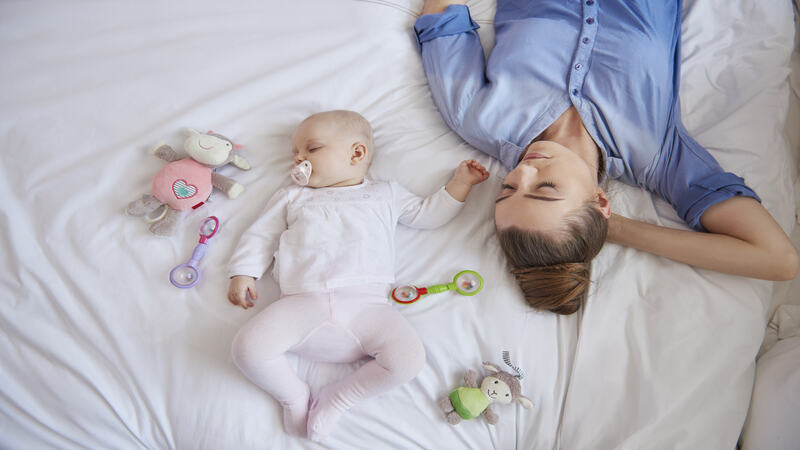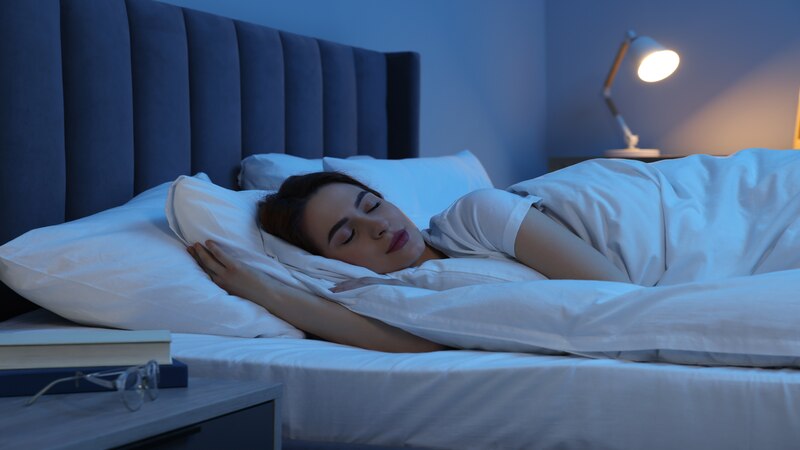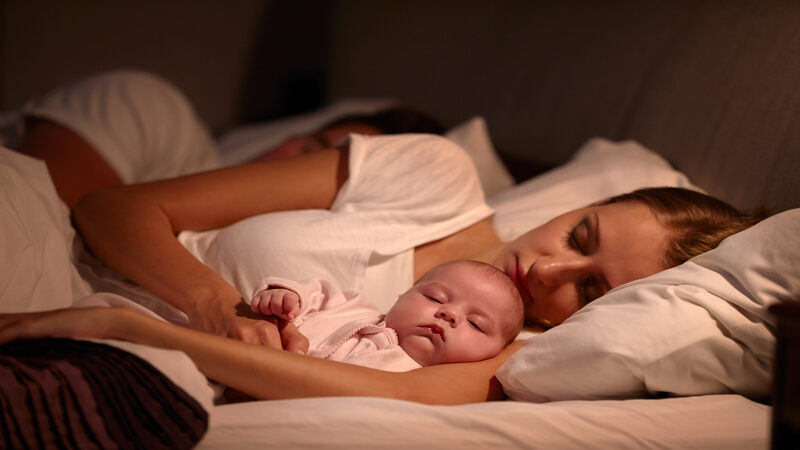
Childbirth is challenging enough, and so is parenting. Managing everything at once can be strenuous. Taking care of a baby is a full-time job. Even though these early years of you, with your infant, can be one of the most cherished times of your life, new mothers tend to neglect their well-being among all the chaos. One trick you can utilize to maintain your sanity when you are a new mother is to sleep when your baby dozes off.
Motherhood is challenging where the mother’s schedule goes off for a toss. Frequent baby feeding, irregular baby sleep patterns and constant baby care can create havoc to a mother’s routine and thought process. Sleep is vital to help a mother combat the stress of motherhood. It is important to a mother to prioritize her sleep schedule to maintain her health and sanity.
Importance of Sleep for New Moms
Being a new mom isn’t a piece of cake. Your body is still recovering from childbirth, and simultaneously, you have to take care of your newborn. All of these can become a bit overwhelming. Hence, you must find the balance between your baby and yourself.
Sleep deprivation can peak during the first few months after childbirth (1). During this time, the infant needs constant caring and attention. Moreover, they must be fed at least 5-6 times. Even though newborns can sleep for up to 14 hours a day, they tend to wake up after every 2-4 hours (2). Therefore, establishing a schedule during the first few months can be challenging enough.
Sound sleep is crucial for new mothers as your body needs rest to recover from the physical and emotional stress of pregnancy and childbirth. New moms often have half the recommended hours, which is only 4-5 hours of sleep. Sleep is connected to your hormonal activity (3), body temperature, eating, digestion, and mental health. Therefore, you must have a sound sleep of 7-8 hours because it is vital for new mothers (4).
Why is it Important to Nap When Your Baby Dozes Off?

New mothers face several postpartum challenges, including managing their sleep schedules. Newborns tend to wake up abruptly in the middle of the night, disrupting a mother’s sleep. You must take advantage of your baby’s short naps during the day. However, most mothers mistakenly use that time to clean the mess and do the household chores.
Your priority is to get some sleep, as it helps you deal with your postpartum depression (5). You need to understand that sleep is equally crucial for your health as having a nutritious diet. Mothers can’t get an uninterrupted 8 hours of sleep in the night because babies need to be fed after regular intervals. Hence, a new mother must sleep whenever she has some free time.
How to Manage Sleeping When Your Baby Sleeps

A couple of tips might help you to get a sound sleep:
1. Don’t Be Shy And Seek Help
New mothers have a lot on their plate. Therefore, never shy away from asking for help. Ask your close ones to help you out with the chores or take care of the baby for a while so that you can take a nap. During the weekends, ask your partner to look after the newborn or help you with household chores
2. Avoid Caffeine And Alcohol
While coffee or a nice glass of wine might seem tempting, both caffeine and alcohol can interfere with your sleep (6). However, if you crave coffee or alcohol, it is better to have it during the day and avoid it in the evening or night
3. Exercise Properly And Stay Energized
Going for a walk or doing some light exercises can help you stay more energized during the day and sleep better at night. Taking some time out for yourself can help you feel relaxed and beat postpartum depression.
How to Create a Sleep-Conducive Environment for You and Your Baby
Sleeping during the daytime can be challenging, especially if you have a lot of people staying in your home. Sounds and other disturbances interfere with your sleep.
The best place for you and your infant to sleep is in a quiet, dark room, away from noise. While sleeping, keep your phones and alarms on silent so that you and your little one can sleep without disturbance.
A pleasant and warm bath, relaxing massages, soothing music, and comfortable clothes can help the baby fall asleep sooner.
Top Tips to Sleep When Your Baby Dozes Off

Setting up a sleep schedule can be tedious. Hence, we curated a few tips that might help you take a nap when your baby naps:
1. Sleep Whenever You Can
Especially during the first few months after the birth, try to sleep whenever the baby sleeps, even during naps. Take short naps during the daytime when your infant is taking a nap. Don’t worry about your chores. You can carry them out after you wake up feeling rejuvenated.
2. Keep Track of Your Baby’s Sleep Schedule
During the first few months after birth, your infant’s sleep cycle mostly depends on their feeding schedule. As they get older, you can establish a routine. Tracking your baby’s sleep schedule can help you adjust your schedule.
3. Seek Emotional Support If Required
The postpartum phase comes with a lot of challenges. You can have a lot on your plate as you tend to get stressed and overthink situations. Stress can affect your sleep cycle (7). Seek out a counselor or join a support group that will help you cope better with these situations. Talk to new mothers going through a similar phase, which will help you feel less lonely.
Are There Any Precautions to Take When Sleeping with Your Baby?
Yes. You can take precautions if you follow the following steps:
- During the first year, your baby must sleep in their crib (8).
- Once your infant starts to sleep with you on the bed, keep the pillow guarded around your little one. It will ensure your little one doesn’t fall off the bed while turning around.
- Keep anything with sharp edges away from your child so they don’t get hurt while sleeping. Moreover, never let your newborn sleep alone on a couch, sofa, or armchair.
Sleep is important for a new mother, but getting the much-needed sleep can be challenging, especially when caring for a newborn. It is crucial to take regular breaks and turn over the care of your newborn to a family member or a trusted individual, in addition to sleeping when your baby falls asleep. Frequent breaks coupled with frequent naps will help you with the ammunition you need to cope with caring for an infant.
FAQs
1. Why Can’t I Sleep When My Baby Sleeps?
Pregnancy and delivery can take a toll on your health. The sharp decline in estrogen and progesterone levels right after your delivery can lead to disturbances in your sleep cycle. At times, you cannot fall asleep even if you want to. During those times, relaxing exercises and a nutritious diet can help balance your hormones and aid in a peaceful sleep cycle. Reading a good book or playing some soothing music may help.
2. Is It Safe to Sleep When The Baby Sleeps?
It is completely safe and recommended. You can sleep with your baby for as long as you have taken all the precautions.
References
- Saxbe DE, Schetter CD, Guardino CM, Ramey SL, Shalowitz MU, Thorp J, Vance M; Eunice Kennedy Shriver National Institute for Child Health and Human Development Community Child Health Network. Sleep Quality Predicts Persistence of Parental Postpartum Depressive Symptoms and Transmission of Depressive Symptoms from Mothers to Fathers – https://www.ncbi.nlm.nih.gov/pmc/articles/PMC6644068/#
- Medically reviewed by: Elana Pearl Ben-Joseph, MD – https://kidshealth.org/en/parents/sleepnewborn.html#
- Written By Lucy Bryan, Medically Reviewed by Dr. Alyssa Dweck, Gynecologist, Women’s Health Expert – https://www.sleepfoundation.org/insomnia/postpartum-insomnia#references-252765
- Max Hirshkowitz, Kaitlyn Whiton, Steven M. Albert, Cathy Alessi, Oliviero Bruni, Lydia DonCarlos, Nancy Hazen, John Herman, Eliot S. Katz, Leila Kheirandish-Gozal, David N. Neubauer, Anne E. O’Donnell, Maurice Ohayon, John Peever, Robert Rawding, Ramesh C. Sachdeva, Belinda Setters, Michael V. Vitiello, J. Catesby Ware, Paula J. Adams Hillard, National Sleep Foundation’s sleep time duration recommendations: methodology and results summary, Sleep Health, Volume 1, Issue 1, 2015, Pages 40-43 – https://www.sciencedirect.com/science/article/abs/pii/S2352721815000157#
- Karen Carlson; Saba Mughal; Yusra Azhar; Waquar Siddiqui. -University of Nebraska Medical Center; Dow University of Health Sciences; UMKC – https://www.ncbi.nlm.nih.gov/books/NBK519070/#
- The Unexpected Impact of Caffeine and Alcohol on Sleep – https://www.sleepfoundation.org/sleep-news/the-unexpected-impact-of-caffeine-and-alcohol-on-sleep#
- Maureen E. McQuillan, John E. Bates, Angela D. Staples, Kirby Deater-Deckard, A 1-year longitudinal study of the stress, sleep, and parenting of mothers of toddlers, Sleep Health, Volume 8, Issue 1, 2022, Pages 47-53 – https://www.sciencedirect.co m/science/article/abs/pii/S2352721821001753#
- Stanford Medicine children Health, Infant Sleep- https://www.stanfordchildrens.org/en/topic/default?id=infant-sleep-90-P02237#
